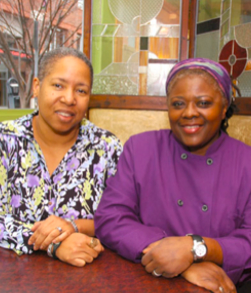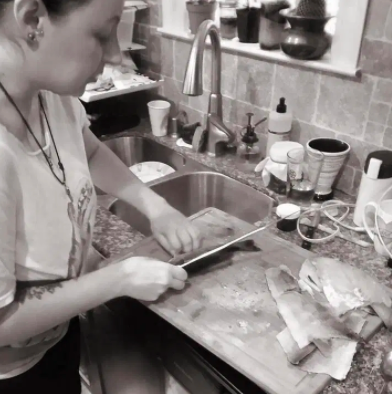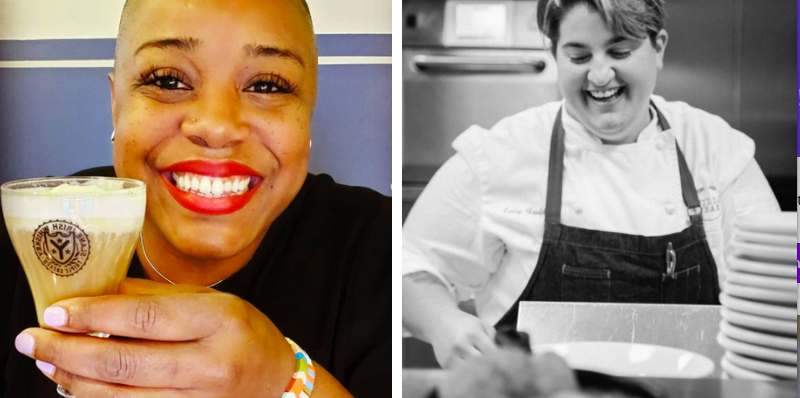Many people associate Southern food with fried chicken, biscuits, and sweet tea. Traditional Southern foodways are absolutely integral to the American culinary tradition, but the South is changing. The largest group of Vietnamese outside of California live along the Gulf of Mexico; the fastest-growing region for Latinx is the Southeast; and one of the greatest concentrations of Indians in the United States resides in Dallas, Texas. The country is embracing Southern food—and learning that what defines Southern food has evolved and changed. The food of the new South consists of biscuits and burritos, catfish and chapatti, hoecakes and hummus.
Our long reputation of homophobia and hatred is changing, too. (We’ve all sadly learned the South does not have an exclusive on racism or ignorance.) When I was growing up everyone had a cousin who was “light in the loafers” or knew of a pair of spinster ladies that never married. For many years Hot-lanta and Miami were the gay meccas that saved legions of gay men and women from living a closeted life. Thankfully, life for queer people in the south is changing along with our reputation and food. The change is led by these food folx living their full lives, not hidden in closets, but leading in their communities to make them, and us, better.
As a Southern chef myself, I’ve come across many incredible Southern food folx. Here’s a roundup of women I admire, and women that are making a difference in Southern cuisine and the region, one delicious sip or sup at a time.
Bon Appétit, y’all!
Tiffanie Barriere
View this post on Instagram
No one, drink in hand or not, can resist Tiffanie’s bright, beautiful smile. Ah, but then she speaks. Believe me, her low, husky Southern drawl is as intoxicating as her libations. Let me tell you, she had me at hello.
Tiffanie calls herself The Drinking Coach; her main goal is to provide “education, service, and fun with every pour” with an attitude that says “we must eat daily, let’s not forget to have a quality drink to join us.” She’s the exact opposite of the too-cool-for-school bro-bartenders with waxed mustaches, suspenders, and glacial pace of pour. The love of her craft and calling truly shines from within. Recognized as an influencer on America’s drink scene, she is a member of the Tales of the Cocktail Grants Committee and the James Beard Advisory Board. She was formerly the Beverage Director for One Flew South, deemed “Best Airport Bar in the World” — at the world’s busiest airport, Hartsfield Jackson International, no less. None of this, not one ounce of fame or her long list of accolades, has impacted her friendliness or approachability.
This Louisiana-Texas native is currently an Atlanta-based independent bartender and entrepreneur, navigating Covid by creating cocktail menus for pop-up dinners, hosting online mixology lessons, and connecting mixology and farm to table culinary culture through her bartender’s creativity. Recently, she’s started sharing the hidden stories of her unrecognized POC ancestors that, despite their situations, contributed to American culture in many areas including art, botany, cuisine, education, engineering, and much more. Her Instagram game is en pointe, offering up not only tasty recipes, but also Food and Beverage leadership, a history lesson, and a sense of enthusiasm about her craft that explodes through the screen.
Ashley Christiansen

The first time I ate Ashley’s food was not at one of her five Raleigh, NC restaurants, but at the Southern Foodways Alliance (SFA) Symposium. The SFA documents, studies, and celebrates the diverse food cultures of the changing American South. Typically, the symposium event is a weekend-long grazing affair concentrated on the 3-Bs: bourbon, barbecue, and bacon – and lots of all of them. Ashley served a multi-course all-vegetarian feast, complete with dishes such as her Smoked Tomato Pie with Whipped Corn Cream and Crispy Okra with Benne-Tahini dressing that nearly a decade later, still stands in my mind as one the favorite meals of my adult life. Yes, the food was good, really good, especially considering it was served to hundreds of people. More so, I loved that she flipped expectations on their freaking head and had been confident in her choice to do so.
A few years ago when the state of North Carolina was deeply entrenched in the Battle of the Bathrooms, a customer wrote to Ashley to complain about the non-gender bathroom policy for her restaurants, essentially telling her to not voice her opinion, but to “shut up and cook.” This multiple James Beard award-winning chef and successful businesswoman didn’t come out guns a-blazin.’ She responded to the very public fracas with a lengthy, thoughtful message capped by sharing her company’s vision statement: “To create a seat for everyone at the table through genuine, hospitality-driven experiences that celebrate the people and places of our community.”
In her business she advocates for mentorship, stewardship, and hospitality, recognizing that these are only possible “through the perspective and commitment of a diverse set of voices, including women, people of color, immigrants, and gender non-binary people.” Ashley is a true leader. Separate from the fact that her food is absolutely outstanding you want to patronize her restaurants and follow her because as the expression goes, “not all sheroes wear capes.” Some of them wear chef coats.
Kelly Fields
View this post on Instagram
Kelly is the chef-owner of the acclaimed restaurant Willa Jean in downtown New Orleans. She and I have grown to know each other from working together at different culinary events, including the Human Rights Campaign Fund Chefs for Equality Dinner in Washington D.C. When we first met, I was touched by both her humility and gentle kindness, but what I have learned is that her softness is backed by an iron-strong will.
Her restaurant lineage traces through a famous male chef that was famously busted during the #MeToo movement. Instead of allowing that association to brand her, she’s willing her own destiny – and the destiny of others. She is making an impact by mentoring several emerging New Orleans chefs. In 2017, she launched the “Yes Ma’am” foundation to inspire, encourage, and mentor the next generation of women in the restaurant and hospitality industry. Kelly states, “We should all be advocates for women and minorities having access to the same amount and quality of resources in this industry.”
Winner of the 2019 James Beard Foundation Outstanding Pastry Chef award, her flavor combinations are complex yet elegantly simple. She has cooked and tasted her way throughout the United States, Europe, and the Middle East and shares those influences in her recipes both at her restaurant Willa Jean and in her award-winning cookbook, “The Good Book of Southern Baking.”
I’ve long said that Southern food is a living, breathing cuisine. We can be known for our dear biscuits and cornbread, but it is only natural that the cuisine also changes and grows. Chef Kelly Fields brings that imaginative curiosity and playful energy into her pastry kitchen with dishes like Chocolate Flan with Condensed Milk Sorbet, Sweet Potato and Toasted Honey Marshmallow Pie, and Key Lime Pie with Whipped White Chocolate Cream. Warning! Her IG feed will make you drool!
Vivián Joiner and Stephanie Tyson

The married duo of Vivián and Stephanie are the co-owners of the award-winning restaurant, Sweet Potatoes (Well Shut My Mouth) where they serve southern-inspired uptown, downhome cooking in Winston Salem, NC . They say it’s “Not soul food, but food that’s good for the Soul.” With Vivian as the front of the house and Stephanie as chef, Sweet Potatoes has become a beloved local landmark and the pair have become part of the heart and soul of their community.
I’m not certain exactly when I first met Vivian and Stephanie, but we’ve crossed paths over the years. From the moment I met them, their relationship struck me as solid; like, core-of-the-earth-solid. You know that kind of solid when you see it. Anyone dealing with working from home these past months with your S.O. knows how hard it can be to work from the same space – try working side-by-side in the same business?! And the restaurant industry is a hard one. It would be tough on any couple, much less a pair of Black lesbians in the South opening a restaurant in a former rooming house-pool hall in the “bad part of town.”
Well, they’ve not only done it; they’ve also excelled. Recently they celebrated 18 years in business – and helped transform what’s now known as the Downtown Arts District into a destination. Their food has gained both local and national media attention. The Yelp reviews read like a restaurant owner’s dream. How could it not with Stephanie’s incredible dishes like Marinated Collard Greens and Beet Salad with Grilled Shrimp, 3-Cheese Macaroni & Country Ham Soufflé, Drunken Pork Chops, and “Spaghetti with a Drawl,” an absolute comfort food dream comprised of pasta tossed in a creamy Creole sauce with smoked sausage, country ham, and fried chicken tenders? (Needless to say, the menu also features quite a few sweet potato dishes.)
Lis Hernandez

Native Venezuelan Lis Hernandez is a first-generation American and the chef-owner of Arepa Mia located in Sweet Auburn Curb Market, a traditional Black market in downtown Atlanta. Arepas, which are prominent in the cuisines of Colombia and Venezuela, are corncakes made of pre-cooked, gluten-free corn flour known as harina. Arepas are eaten across both countries, across all socio-economic groups, at all times of day.
Lis started making arepas as a child with her mom, a street vendor, in Venezuela. She herself started her decade-old business at a card table at an indoor market before moving to Sweet Auburn Curb Market. When asked to share my favorite Atlanta restaurants with out-of-town guests, I inevitably include Arepa Mia. I find her story incredibly joyful and inspirational. As a teenager, she decided that cooking was her passion and wanted to share her gift. She says, “Arepa Mia is about simple comfort, simple love, and simple food.” The tagline of her restaurant is “Happy Stomach, Warm Heart.”
Lis prepares a mouthwatering recipe known as arepa pelua (“hairy arepa”), named for the long strands of shredded meat inside; at her restaurants, she uses grass-fed beef from local farms including White Oak Pastures, a 150-year-old family farm, and Riverview Farms, the oldest organic farm in Georgia. Some of her other dishes include the Domino arepa, made with organic black beans, fried sweet plantains, caramelized onions, roasted red peppers, and queso de año as well as the Reina Pepiada, a chilled chicken salad stuffed arepa made with zesty lime, grassy cilantro, and tons of creamy avocado. She prepares the food of her homeland with local ingredients grown on heritage farms and in the very market where Martin Luther King Jr.’s family once shopped. The multi-cultural, boundary-crossing aspects of this represent much of what I consider the modern Southern table to be.
Julia Skinner

Fermented mud and harvesting natural pigments for ink may not sound like it belongs in a piece about food folx, but it is when that piece features Dr. Julia Skinner, a modern-day Renaissance woman. Julia is the founder and director of Root, an Atlanta-based food history and fermentation company. Through Root, described as “historic food for the modern world,” she offers online fermentation classes, a history-driven newsletter, and membership program.
She’s also an author– she wrote a book about the history of teatime– has a PhD in library studies, consults on films, is a visual artist as well as an art curator, and offers a funky monthly #ATL CSA with ferments such as Masala Lime Kraut, Tulsi Vinegar Pickled Courgettes, and Pine Needle Vinegar. See? Mud and pigment aren’t so surprising. (By the way, I’m taking a class co-taught by her on how to make my own Malian Bógólanfini, or mudcloth – as well as another class on harvesting wild yeasts.)
We first met at an event at the Atlanta History Center exhibition, titled “¡NUEVOlution! Latinos and the New South.” I mean this in the nicest way: as a committed food nerd, she is hands down one of my favorite food nerds.
Every Atlanta-based workshop run through Root includes a scholarship to allow someone from an underserved community to attend free of charge. Julia also appreciates that her identity as a queer woman is an important and formative component of her business. Root regularly offers scholarships for online classes specifically aimed to help LGBTQ+ and BIPOC culinary professionals, activists, and home cooks learn culinary skills they can use to serve their families and communities.
As both a Southerner and a culinary professional, I strongly believe Southern cuisine is a living, breathing, growing thing with tremendous diversity. The work of the food folx here goes beyond the stereotypes and misinterpretations of Southern food and cooking. From white linen formal to worn wooden farm table, there’s world-class food and community in the South.


What Do You Think?